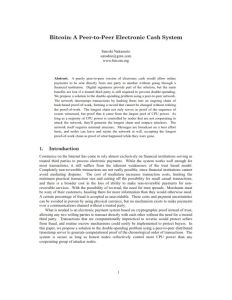
Satoshi Nakamoto
Bitcoin
A Peer-to-Peer Electronic Cash System
www.bitcoin.org, 2008
What's inside?
Are bitcoins the future of money? Will code replace currency? Read the paper that birthed the bitcoin.
Recommendation
This founding document of the bitcoin movement lays out why a “purely peer-to-peer” electronic payment mechanism is necessary and how bitcoins answer that need. Bitcoin enthusiasts claim that the new currency will replace intangible trust in paper money and in financial intermediaries with tangible code. But unless you’re a software expert, you’ll need to trust that the system’s code is safe. Meanwhile, media reports of price swings, spurts and crashes risk painting bitcoins as just another e-speculation. getAbstract recommends this technospeak-laden paper to IT and finance professionals and to anyone eager for a glimpse into what could be the future of money.
Take-Aways
- The exchange of money anywhere, even online, depends on trust.
- Digital currency operates on “cryptographic proof” rather than trust.
- A bitcoin is “a chain of digital signatures” that proves ownership and uniqueness.
- Digital signatures, along with “public keys,” create a “chain of ownership” that anyone can track to verify that a bitcoin hasn’t been “double-spent” or duplicated.
- A “proof-of-work” protocol protects the system from hackers and ensures its integrity.
Summary
Money exchanged anywhere depends on the “trust-based model”: A payment is never final because a bank can reverse that sum if it’s in dispute, even if it’s for an already rendered service. Because banks’ involvement has a cost, low-value transactions end up being uneconomical. Also, fraud is inherent in the system, so checking for creditworthiness adds even more expense.
“A purely peer-to-peer version of electronic money would allow online payments to be sent directly from one party to another without going through a financial institution.”
A “peer-to-peer” system that doesn’t need a third party operates on “cryptographic proof” rather than trust. A bitcoin, a unit of electronic money, is “a chain of digital signatures.” These unique signatures can prove a specific individual or entity owns a particular coin. With bitcoins as electronic currency, sellers would gain from receiving payments that are irreversible, and escrow accounts would assure purchasers.
“The system is secure as long as honest nodes collectively control more CPU power than any cooperating group of attacker nodes.”
In real life, you exchange objects, but, in online life, you copy data – be it a document, a music file or a photo. With other e-coins, that could result in “double-spending” if the data were code that represents a unit of currency. With bitcoins, digital signatures of the coin owner along with the “public key” of the next owner added to the string of code creates a “chain of ownership” that anyone can track to verify that the coin hasn’t been double-spent. A “time-stamp server” establishes the chronology of the transaction. A “proof-of-work” protocol furnishes a public record of bitcoin transactions that hackers would find “computationally impractical” to modify. Adding new bitcoins into the supply takes the energy of CPU processing and electrical power, much like “gold miners expending resources to add gold to circulation.” The nature of the open source code means all bitcoin dealings must be visible, but secret public keys keep individual transactors’ identities confidential; that’s similar to stock exchange transactions, where you know the size and timing of securities trades, just not who the buyers and sellers are.
“The network is robust in its unstructured simplicity.”
Bitcoins support electronic sales and purchases through unique digital signatures, thus removing trust and intermediaries from the online commercial equation. Eliminating the possibility of double-spending with complex proof-of-work chains makes for a viable currency that operates on a “consensus mechanism.”
About the Author
Satoshi Nakamoto is the alias for the anonymous developer or developers of bitcoin.
This document is restricted to personal use only.
My Highlights
Did you like this summary?
Read the articleThis summary has been shared with you by getAbstract.
We find, rate and summarize relevant knowledge to help people make better decisions in business and in their private lives.
Already a customer? Log in here.

















Comment on this summary